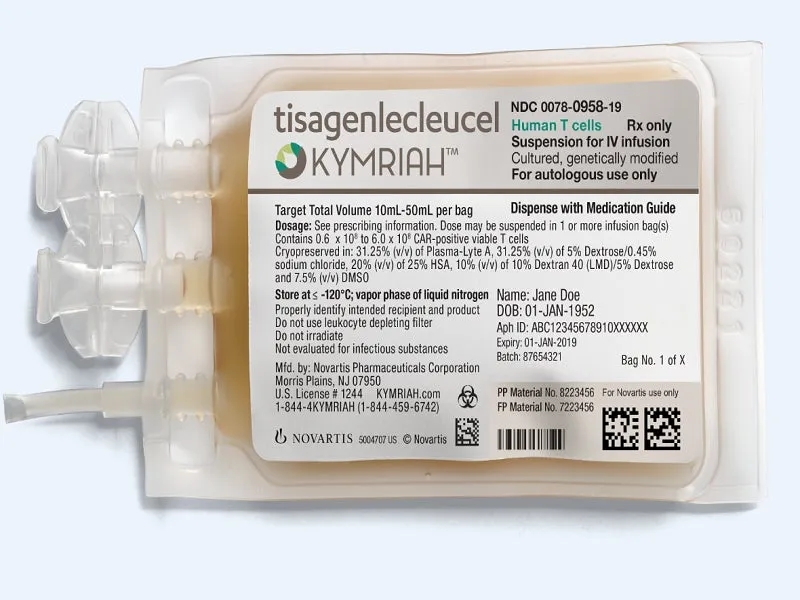Kymriah Approval FDA
Kymriah Approval FDA
On April 22, 2020, Novartis announced that the U.S. Food and Drug Administration (FDA) granted Kymriah® (tisagenlecleucel) Regenerative Medicine Advanced Therapy (RMAT) designation for the treatment of relapsed or refractory follicular lymphoma.
Kymriah®, as a one-time treatment, is the first FDA-approved CAR-T cell immunotherapy. Refractory follicular lymphoma is the third indication for Kymriah®, which is also approved to treat relapsed or refractory pediatric and young adult acute lymphoblastic leukemia and relapsed or refractory adult diffuse large B-cell lymphoma.
Follicular lymphoma is the second most common form of non-Hodgkin lymphoma, a chronic lymphoma accounting for approximately 22% of non-Hodgkin lymphomas. The most common manifestation of follicular lymphoma is painless lymphadenopathy, typically presenting with multi-site lymphoid involvement, sometimes with palpable supraclavicular lymphadenopathy.
Patients with follicular lymphoma are often sub-classified into predominant small cell, mixed small and large cell, and predominant large cell types. Patients with predominant large cell follicular lymphoma have a higher proliferative rate, more rapid progression, and shorter overall survival with single-agent chemotherapy regimens. Most patients do not exhibit fever, night sweats, or weight loss, and approximately 50% of patients have a low-risk International Prognostic Index (IPI) score of 0-1. Less than 10% of patients have a high-risk IPI score (4-5).
The FDA granted Kymriah® RMAT designation based on preliminary clinical evidence from the ELARA trial, an ongoing multicenter, phase 2 trial evaluating the efficacy and safety of Kymriah® in adult patients with relapsed or refractory follicular lymphoma.
About Kymriah®
Kymriah® (tisagenlecleucel), the generic name for the Chinese translation “tieshalaixie,” is a CAR-T cell immunotherapy co-developed by the University of Pennsylvania and Novartis as a revolutionary immunocellular therapy. CAR-T cell therapy for malignant tumors works by extracting and modifying the patient’s own immune cells to attack cancer cells. The entire treatment process is expected to take 22 days and features precise targeting, cytotoxicity, and sustained activity. Kymriah® is the world’s most advanced cellular immunotherapy.

Side Effects of Kymriah®
Kymriah® may cause side effects that are severe or life-threatening, such as cytokine release syndrome or neurological toxicities.
Patients with cytokine release syndrome may experience the following symptoms: difficulty breathing, fever (above 38°C), chills, nausea, vomiting, diarrhea, muscle or joint pain, low blood pressure, or dizziness.
Patients with neurological toxicities may experience the following symptoms: headache, delirium, confusion, agitation, anxiety, seizures, difficulty speaking and understanding, loss of balance, etc.
Serious allergic reactions may occur after Kymriah® infusion, and there is an increased risk of infections.
Kymriah® may also cause a decrease in one or more types of blood cells (red cells, white cells, or platelets) in patients. Doctors should perform blood tests to monitor all blood cell counts for patients receiving Kymriah® treatment. If a patient develops fever, fatigue, bruising, or bleeding, they should immediately notify their healthcare provider.
Patients receiving Kymriah® treatment may also develop hypogammaglobulinemia due to decreased immunoglobulin levels in the blood, potentially increasing the risk of infections and requiring indefinite immunoglobulin replacement therapy.
There is a potential risk of developing secondary malignancies or cancer recurrence in patients treated with Kymriah®.
For at least 8 weeks after Kymriah® treatment, patients should refrain from driving, operating heavy machinery, or engaging in other potentially hazardous activities, as treatment may cause temporary memory impairment, lack of coordination, somnolence, confusion, weakness, dizziness, and seizures.
Female patients should undergo pregnancy testing before using Kymriah®, and its use is not recommended for pregnant or breastfeeding women.
After receiving Kymriah® treatment, patients should not donate blood, organs, tissues, or cells for transplantation.
